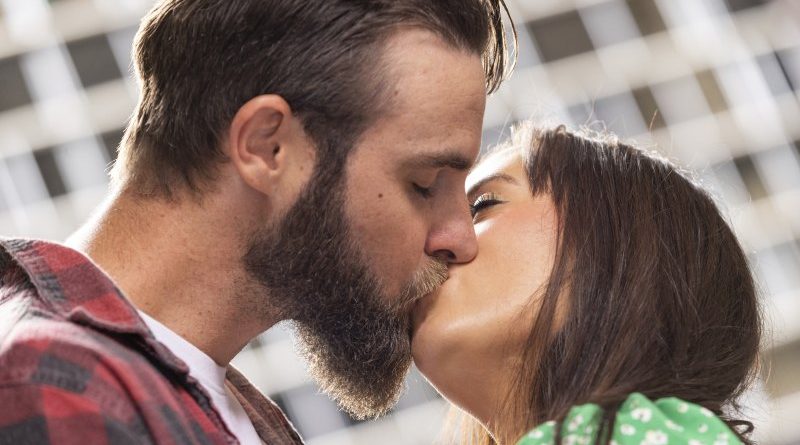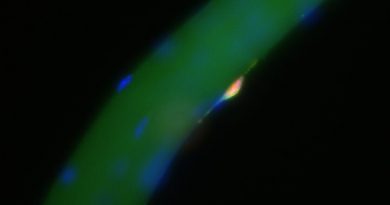A form of exercise? The science of why we kiss
Some say kissing evolved out of literal hunger and, today, a kiss provides the chance to satiate a hunger for something else: intimacy, information about someone we like and an expression of fuzzy feelings.
It’s one of the first explorations of a potential partner, a moment that can transport us to a state of wondrous oblivion. Or expel us into aversion.
Which might, in part, be the point.
Sealed with a kiss: Aaron Borowski and Amber Hadfield.Credit:Cole Bennetts
Kissing, research has found, is one way to assess our compatibility with a potential partner. We discover if we are in sync, but we are also close enough to smell and taste the other person which can provide biological cues for their overall health and genetic fitness.
Specifically, we get a close-up whiff of their natural scent, which originates from genes that are part of our immune system. We also share about 80 million bacteria during a 10-second kiss, which is one way of getting down to the nitty-gritty of the person at the other end of our lips.
For business analyst Amber Hadfield, 28, and performance coach Aaron Borowski, 32, kissing is an important communication tool in their relationship.
“I love kissing and I would be worried if we weren’t doing it,” Borowski said. “It’s just part of a connection. The same as talking.”
He adds: “You can adapt to each other’s style over time.”
The couple’s first date on Valentine’s Day last year, after meeting on the dating app Bumble, started with coffee and ended with a kiss.
Now kissing punctuates their romance. “We always kiss when we get home from work and there are goodnight kisses before we to bed,” Hadfield says.
A good kiss is bliss – a state that is reflected in our brains. One 2014 study found that romantic kissing among couples heightens and harmonises their brain activity.
A bad kiss, however, can send us running for the hills, as about 59 per cent of men and 66 per cent of women, in one survey, said they have done.
It bonds you and connects you and keeps you in that state of being in love… I always say ’never stop kissing.
The intensity of the sensation – and our response to it – isn’t at all a surprise. Our lips are our most exposed erogenous zone which, according to biologist Desmond Morris, “transmit a great deal of pseudo‐genital signalling during amorous encounters”. They are also one of the most sensitive parts of our body, jam-packed with nerve endings.
So, in the lead up to Valentine’s Day, the day we can throw off our masks and let our lips lock with another, the question is: Why do we do it? Is it good for us? And what happens in our brains and bodies when we kiss?
What happens when we kiss?
When we kiss, we stimulate the nerves in the lips, which travel up to the brain, explains psychosexual therapist, Jacqueline Hellyer. “This releases a cocktail of neurochemicals that lead to euphoria – assuming that it’s a good kiss,” she says. “You get oxytocin, which is the bonding one… dopamine, which gives you that euphoric high… They are the basic chemicals that are released when you fall in love.”
Kissing keeps us bonded and keeps the happy hormones flowing.Credit:Cole Bennetts
Kissing, which requires more than a dozen facial muscles, floods our brain with oxygenated blood, dilates our pupils, deepens our breath and flushes our cheeks, explains Sheril Kirshenbaum, the author of The Science of Kissing: What Our Lips Are Telling Us.
It also lowers cortisol, relieving stress. It is fair to say that kissing, then, is a form of exercise, boosting our feel-good chemicals whenever we do it, and lowering our stress levels. The more we do it, the better it is for us – and for our relationships: among long-term couples kissing frequency is associated with relationship satisfaction.
Why do we do it?
Desmond Morris argues that kissing evolved out of an act of love and survival that was passing chewed-up food between a parent and a baby’s mouth. Others suggest it evolved to mimic a baby’s experience of physical pleasure and bonding from breastfeeding.
But, biology is only part of the picture, says Associate Professor Priscilla Dunk-West, a researcher of relationships and intimacy at Charles Darwin University.
“We often look to biological explanations for behaviour (for example kissing) but biological ‘drives’ cannot be understood without the historical, cultural and social – even political – contexts in which we live,” she explains.
“Kissing has a range of social contexts and meanings: kissing a child’s sore knee after injury is often a parental response to soothe a child. Some cultures kiss on both cheeks as a form of greeting. Kissing can also be romantic and sexual.”
In fact, many cultures are not into romantic kissing at all. A 2015 study of 168 different cultures around the world found that less than half – 46 per cent – engage in romantic kissing.
Kissing can be a ‘love practice’: a way that couples punctuate the day.
What did the researchers make of this?
“There is likely a biological underpinning to kissing, as it can often involve exchange of pheromones and saliva, and also pathogens – which might be particularly dangerous in societies without oral hygiene, where kissing may lead to the spread of respiratory or other illness,” said co-author, Justin Garcia, research scientist at Kinsey Institute at Indiana University.
Others suggest that it’s not oral hygiene, so much as women’s liberation. Women who have more autonomy are free to pursue pleasure and kiss who they like, which provides them with information to choose their partner.
“We know we find the scent of someone who has a very different immune system to us more attractive, which means our offspring will be healthier,” Hellyer explains.
Beyond the first kiss, repeatedly pressing our lips to those of the one we love keeps us bonded, and keeps those happy hormones flowing. “Kissing can be a ‘love practice’: a way that couples punctuate the day,” Dunk-West says. “When kissing is tied to a partner feeling appreciated, this feels positive.”
What makes a good kiss?
“We do have evidence that saliva has testosterone in it. And there is also evidence that men like sloppier kisses, and more open-mouthed kisses. That suggests to me, they are unconsciously trying to transfer testosterone to trigger the sex drive in women,” renowned anthropologist, Helen Fisher of Rutgers University, has said.
Too sloppy, too hard or too fast, however, are common kissing complaints Hellyer hears in therapy sessions.
“I say, ‘well, have you told them how you do want to be kissed?’ Because often a kiss is a learned thing, and we can certainly change the way we kiss. You can learn to kiss better, and it can be quite fun practising.”
Even when no tongue is involved, we can learn to be better kissers. Is your peck on the cheek a quick “mwah” or a proper kiss?
“A lot of couples end up doing the platonic peck… and they’re not bringing themselves to the encounter.”
An intentional kiss, even when it is a peck, involves presence and can release the love hormones.
“Kissing is important,” Hellyer says. “It bonds you and connects you and keeps you in that state of being in love, not just being companions and housemates which a lot of couples fall into over time. I always say ‘never stop kissing’.”
Additional reporting by Damien Woolnough
Make the most of your health, relationships, fitness and nutrition with our Live Well newsletter. Get it in your inbox every Monday.
Most Viewed in Lifestyle
From our partners
Source: Read Full Article





